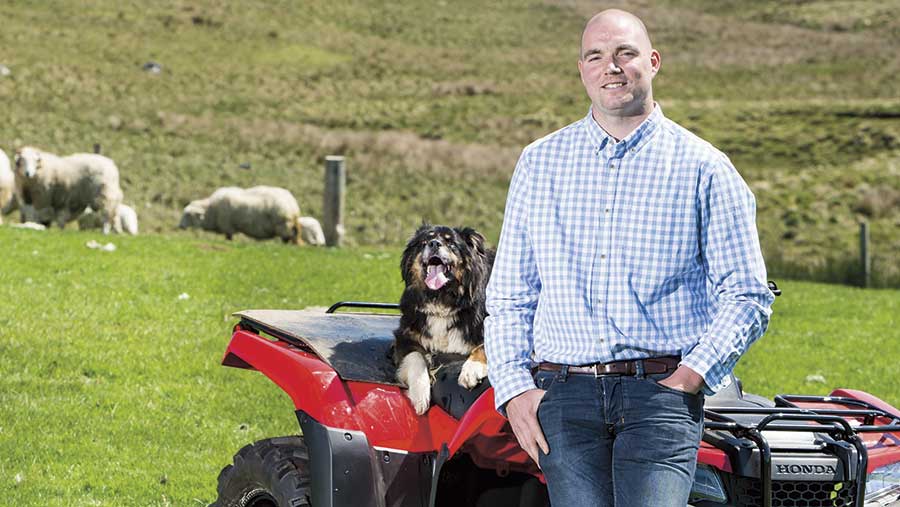Farmers Weekly Awards 2016: Young Farmer of the Year
David Cooper
Tardoes Farm, Muirkirk, East Ayrshire
Increasing his farm size from 190ha to 2,000ha and his flock size from 350 ewes to 3,000 breeding ewes and 700 hoggets is only really the start of what David has achieved.
He was born and bred on the family beef and sheep farm in Devon and when changes to the grazing rights on Dartmoor meant the family farm had 350 ewes needing a home, David was only too keen to be a part of the plan.

© Jim Varney
The family bought 190ha of dilapidated opencast mining land in East Ayrshire, Scotland. And 17-year-old David managed to persuade his parents to let him be the one to farm it. A lot of the land had not been grazed for years due to lack of fencing. “I couldn’t afford to pay anyone else to fence it, so I taught myself,” he says.
See also: Farmers Weekly Awards 2016: Young Farmer of the Year finalists revealed
He became very good at it, started doing it for others and now runs a fencing contracting business alongside the farm. He recently bought a tracked post driver and, to date, he has completed about 50,000m of fencing on his own farms.
Farm facts
- 2,000ha hill farm, 1,750ha owned and 250ha rented
- 3,000 Herdwick and Welsh Mountain ewes put to tup of same breed and 700 hoggets
- Agricultural fencing contracting business run alongside farm
- Lambs sold through farmer co-operative for European market
- Help only employed at scanning and shearing
This entrepreneurial spirit is one of the reasons David deserves the title of Young Farmer of the Year.
Faced with an issue, he not only took it on single-handedly to save costs, he then turned it into a successful business that he could run alongside the farm to help finance expansion.
David is a leader. He’s been using intensive rotational grazing for his Herdwick and Welsh Mountain sheep, which has been a key part of his success, for many years.
He realised early on that when a large mob of his ewes with twins went into his smallest, 2ha field, the grass improved dramatically. And now, in the summer, groups of ewes and lambs will be moved on a daily basis.
This is all part of his simple low-input and low-cost system. He has no feed costs, and only trace-element boluses are given to his sheep. He never breeds from twin ewe lambs because a single lamb will do much better in the hill-farm environment.
Winning ways
- Impressive market focus and profitability
- Fencing business run alongside the farm to aid expansion
- Care for the environment and transformation of the landscape
- Positive approach to local and agricultural community, hosting local show and welcoming visitors to the farm
This system, combined with working alone with his dogs, only employing others for scanning and shearing, is very profitable. And it helps that he knows his market well.
He targets Europe, particularly Italy, and sells through livestock marketing co-operative group Farm Stock.
“I know Italy want light, lean lamb. I know I have demand there, so that’s what I produce.”
He lambs over a three-week period from late April to early May, and lambs are starting to be slaughtered in the third week of July. “I aim to have everything off the farm by the end of October, killing at 12.5kg.”
Another reason he stands out is his approach to the land. The way he has transformed the landscape is astounding.
“My principal vision is to make sure I leave my land in a better condition than when I started,” David says. “I am a custodian for the future generation and must do everything I can to keep hill sheep farming alive.”
And that he has done, improving it so greatly that the land is now worth £500,000 more than when he bought it.
Sponsor’s view
 “The Co-op are proud to sponsor this award. We’ve always supported the UK farming industry and promoted British food and now we are supporting young farmers in our supply chain through our Co-op Farming Pioneers programme”
“The Co-op are proud to sponsor this award. We’ve always supported the UK farming industry and promoted British food and now we are supporting young farmers in our supply chain through our Co-op Farming Pioneers programme”
Ciara Gorst, senior agricultural manager
